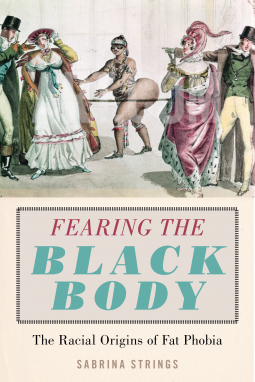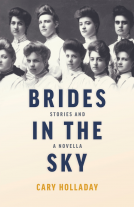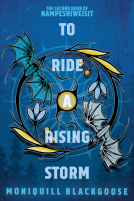
Fearing the Black Body
The Racial Origins of Fat Phobia
by Sabrina Strings
This title was previously available on NetGalley and is now archived.
Send NetGalley books directly to your Kindle or Kindle app
1
To read on a Kindle or Kindle app, please add kindle@netgalley.com as an approved email address to receive files in your Amazon account. Click here for step-by-step instructions.
2
Also find your Kindle email address within your Amazon account, and enter it here.
Pub Date May 07 2019 | Archive Date Jul 02 2019
Talking about this book? Use #FearingTheBlackBody #NetGalley. More hashtag tips!
Description
How the female body has been racialized for over two hundred years
There is an obesity epidemic in this country and poor black women are particularly stigmatized as “diseased” and a burden on the public health care system. This is only the most recent incarnation of the fear of fat black women, which Sabrina Strings shows took root more than two hundred years ago.
Strings weaves together an eye-opening historical narrative ranging from the Renaissance to the current moment, analyzing important works of art, newspaper and magazine articles, and scientific literature and medical journals—where fat bodies were once praised—showing that fat phobia, as it relates to black women, did not originate with medical findings, but with the Enlightenment era belief that fatness was evidence of “savagery” and racial inferiority.
The author argues that the contemporary ideal of slenderness is, at its very core, racialized and racist. Indeed, it was not until the early twentieth century, when racialized attitudes against fatness were already entrenched in the culture, that the medical establishment began its crusade against obesity.
An important and original work, Fearing the Black Body argues convincingly that fat phobia isn’t about health at all, but rather a means of using the body to validate race, class, and gender prejudice.
Advance Praise
"As a sociologist with a rich understanding of social history and cultural studies, Sabrina Strings asks and answers new and immensely generative questions about the ways of thinking that rule the world. Her astute analyses reveal the ways in which seemingly innocent aesthetic judgments about women’s bodies register the effects of deep historical currents of thought and practice."-George Lipsitz, Author of How Racism Takes Place
"This is an important, deeply-researched study of the racialized roots of fat denigration. It should be a must-read for scholars whose work focuses on the history of race, of gender, and of the body—as well as by anyone who is interested in our deeply problematic contemporary culture of dieting and body shame."-Amy Erdman Farrell, Author of Fat Shame: Stigma and the Fat Body in American Culture
"[A] thoroughly researched exploration of the historical relationship between race-and weight-related prejudices...This fascinating and carefully constructed argument persuasively establishes a heretofore unexplored connection between racism and Western standards for body size, making it a worthy contribution to the social sciences." -Publishers Weekly
"In Fearing the Fat Black Body, Sabrina Strings fills what has long been a gaping hole in scholarship on fatness and body size. Her careful historiographical exploration of the racialized roots of anti-fat, pro-thin bias should figure prominently in any academic, medical, political, or popular discussion of the contemporary American 'Obesity Epidemic.' In looking at the complex intersections of race, gender, class, and morality in current American framings of fatness and size, Strings does not simply add race to the conversation but shows that any analysis of body size that does not center race is necessarily incomplete." -Natalie Boero, Author of Killer Fat: Media, Medicine and Morals in the American Obesity Epidemic
Available Editions
| EDITION | Other Format |
| ISBN | 9781479886753 |
| PRICE | $33.00 (USD) |
| PAGES | 304 |
Average rating from 17 members
Featured Reviews
 Cristie U, Book Trade Professional
Cristie U, Book Trade Professional
This was an interesting book that explained how being fat was first a phobia over 200 years ago. The author went into great detail as to how black women in particular have been looked down upon due to being overweight. This was a really interesting book.
 Anna I, Reviewer
Anna I, Reviewer
Fearing the Black Body: The Racial Origins of Fat Phobia by Sabrina Strings was phenomenal. Her explanation on when, who and where the relationships between race, weight and examining centuries of Western artistic values blew me away! Starting with the renaissance era to current day had me highlighting nearly the entire book. Everything she found was backed with notes a reference, Strings dotted her I’s and crossed her t’s in this gem. I love books that give clarity and understating on things in life we always questioned. Thanks to Netgalley and NYU Press for the advanced copy in exchange for an honest review.
 Reviewer 492564
Reviewer 492564
This is an outstanding examination about fatphobia body size, especially in regard to black women. The author uses primary sources from the history of the United States to draw attention to the ways in which fat women, and fat black women in particular, were and are thought of by white society. Engaging with class, the medical establishment, religion, and education, Strings deftly identifies patterns of thought in America that gave rise to anti-fat stigma and the fear of the fat black woman. I recommend this highly for all women.
 IQUOIMOH T, Educator
IQUOIMOH T, Educator
A must read especially in our present time. When will we stop seeing the black body as something to be feared but one to be uplifted. This book is one that I will recommend for my book club.
Readers who liked this book also liked:
We Are Bookish
Mystery & Thrillers, OwnVoices, Teens & YA
Thomas Love Peacock
General Fiction (Adult), Humor & Satire, Literary Fiction
Kendra Langford Shaw
General Fiction (Adult), Literary Fiction


















